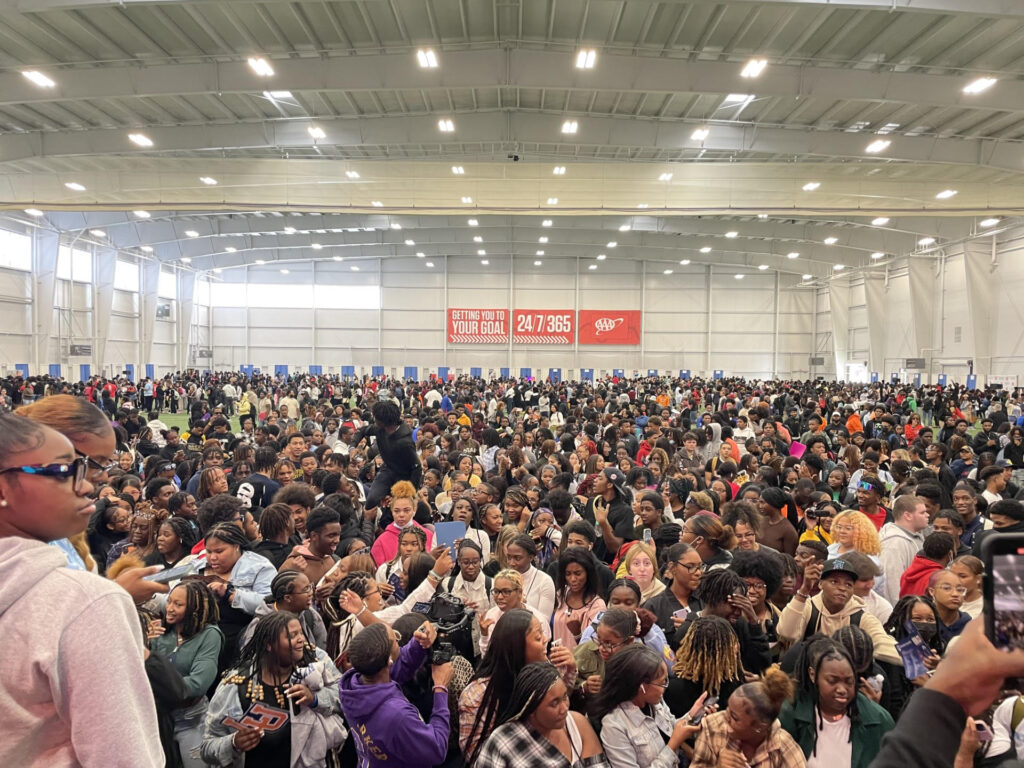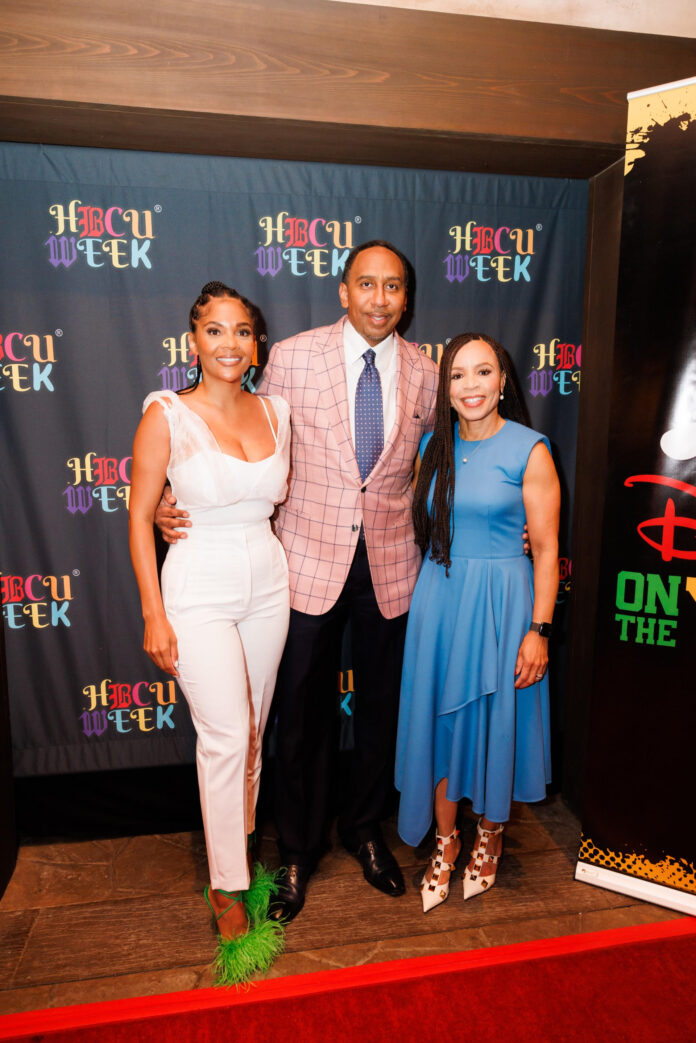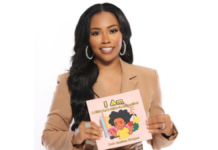( ENSPIRE Community Spotlight ) HBCU Week Hosts Upcoming Fairs in Wilmington, Atlanta, and Arlington
ENSPIRE Contributor: Petra Wolf
Ashley Christopher’s HBCU Week arrives in Arlington this September. HBCU Week works to find high school students and expose them to the historical significance and proud legacies of Historically Black Colleges and Universities. The event brings students looking at HBCUs and recruiters together for higher education opportunities. This fair also gives the students a chance to receive an on-the-spot acceptance from HBCUs. The organization has grown to a point where corporate partners and the HBCU Week foundation contribute to over 2,800 acceptances offered and over 23 million dollars in scholarships awarded.
Ashley Christopher founded HBCU Week in 2017 to encourage enrollment into HBCUs, now especially important with the recent Supreme Court decision around Affirmative Action. As a double HBCU alumna, Ashley takes on the responsibility to reach back while she climbs, exposing youth to the fact that you can do and be anything coming from an HBCU. The event aims to maintain a pipeline of employment from undergraduate school to corporate America. Ashley experienced a lack of diversity in her educational journey and wants to encourage enrollment into HBCUs as well as provide scholarship dollars to students.

ENSPIRE spoke with Ashley and we discussed the growth of the fair and the future in the months leading up to the fair.
What were the initial difficulties of bringing HBCU recruiters together with students?
I would say for us the biggest difficulty in organizing the event from the beginning was just getting started. Where to start contacting the schools, getting the right contact information and the right people on the line confirming their attendance. The logistics were a heavy lift because it involved getting people from all over the country to agree to come to one space at a given time for the first time. It was an unknown small city, Wilmington, Delaware, and we didn’t know what to expect. It was just working to get all those details coordinated to get everybody in the same room was probably the initial difficulty of the event.
What has changed in the process since you started HBCU Week?
What I’ve seen change from the beginning to now is, because of the passion and the authenticity behind the movement, behind this initiative, and the love that I have for students and HBCUs, it’s not difficult to sell our story to anyone. So when we’re trying to convince them to get on board and to come after they experience that first time, they always come back the year after. So what we’re seeing is just an expansion of the brand. When we do have those conversations and get people to commit to coming on-site, it’s really all we need to get that commitment to turn into something long-term.
So you’ll see the number of HBCUs that do show up. It increases year over year with the same schools reporting back every year. It’s just an expansion of adding more and more because it’s believable once you see it. So we’re not telling somebody something that is going to deliver low expectations. It more often than that exceeds those expectations, and they do see what we do in person on site.
What was the process of getting corporate partners on board?
If you’re familiar with the State of Delaware, 60% of Fortune 500 companies are incorporated here. So wasn’t that difficult creating a strategy for who we’ll go after and downtown is so small. It’s not hard to get the Delaware market president of Bank of America on the phone, or the Komoras Company or Wells, Fargo, or Barclays. It was just us internally building a strategy to see who we wanted to align our efforts with and then having those conversations.
I will say, that I’m very protective of the brand in that we don’t align ourselves with companies who are just looking to check a box. We don’t have transactional relationships. We lean into those companies who really want to effect change. Companies that believe in our mission and want to see diversity, equity, and inclusion win. Also, companies that will offer this access to opportunity long term. Not just one year or for the month of September at a certain point in time.
So it’s really about aligning ourselves with those who believe in the mission and are real and they’re easily identifiable. All takes is the conversation. You could figure out who’s who and what the motive is behind the partnership. And it’s just keeping that at the forefront of our minds, making sure that the right companies are in lock. Step with us, and not just people who are looking to check a box or for a photo to put out to say that they were involved. But really, that long-term sustainable corporate relationship is what we’re looking forward.
How does the recent Supreme Court decision affect the fair going forward?
This will be our first fair since that recent Supreme Court decision. But what I will say is the blessing and disguise for us we’re already positioned to fight against those two decisions: the reversal of affirmative action and the reversal of student loan forgiveness. So we’re already creating a space for students to come to universities where they’re celebrated and not tolerated. So we’re not asking you to turn to these institutions that, to be frank, don’t have to consider you. They don’t want to. So, we are welcoming you into the fold, here you have a new family. We’re positioning you to graduate without student day.
So our students that we are servicing year after year can come to a university where they’ll feel welcomed. They don’t have to graduate with loads of student debt. So I would say the effect of that is we’re gonna continue to expand our relationships to invite more and more students into that fold. On the other side of that, HBCUs only account for 3% of colleges and universities nationwide. So we have a capacity issue. All the students that want to go to HBCUs will not be able and then, when they turn to their left or right, they may not be considered just because of the color of their skin.
So while my foundation is working to house these students and give them the opportunities they need, it is not a one-stop shop. This is something that everybody has to lean into, to work towards, to give our students the opportunities they deserve. So I mean, the effect could be catastrophic on Black students who want to go to schools because I recognize HBCUs may not be for everybody. That’s hard for me to even say because I can’t imagine why out of the 101 HBCUs, a black student couldn’t find one that’s for them. But I’m just trying to recognize the people that may fall outside of this space of wanting to come to an HBCU and the alternative may not exist anymore. So I can’t solve that problem on my own. But I’m gonna do everything I can to just continue to create space for students who do want to go to HBCUs and alleviate that burden of student debt.
How should students prepare for this fair if they’re looking for on-the-spot acceptances?
At our college fair, most of our participating HBCUs engage in an on-the-spot acceptance process. If you’re a graduating senior, you just need to come with proof of your GPA or a college transcript. It doesn’t have to be official, it can be unofficial, and your SAT and ACT scores. If you have a requisite GPA and SAT/ACT score you can compete for on-the-spot college acceptances.
You simply just wait in line to speak to the recruiter. They evaluate your academic record and let you know right there where you stand. Since 2017, we’ve offered more than 6,000 on-the-spot college acceptances and that number continues to grow. So any graduating senior out there that comes to our fair, just make sure you have several copies of your transcripts and your SAT or ACT score. Also, a lot of the HBCUs are starting to get rid of the ACT qualification. I’m not sure if it was to do with COVID but I know for at least a period of 3 or 4 years, they kind of overlooked that. I’m hoping they go in a direction where they just don’t consider them at all. But just encouraging the graduating seniors to come with their records so they can compete for those acceptances.
What are you most hopeful about in terms of the HBCU landscape?
For a long time, I have been hopeful that the HBCU landscape is just seeing more opportunities for students to attend without the massive burden of student debt. What comes to that mind first is a lot of our competing PWIs (Private White Institutions) have much larger endowment funds so they can offer merit-based scholarships at a much larger rate. We can offer these students much more money to attend than our HBCU counterparts.
So what I’d like to see in the near future hopefully, is the endowment funds growing in HBCU Space and more merit-based scholarships being offered to students. So they don’t have to choose between the University of Pennsylvania and Howard but go to UPenn because they could afford to give them a full ride and Howard couldn’t. Because that HBCU experience for 4 years is life-changing for that student. So, I just like to see more opportunities arise and that’s why we work so hard with our corporate partners to establish these scholarships to eliminate that debt. Because that’s really what it comes down to when these students are choosing between an HBCU and a PWI.

HBCU Week Foundation also secured several corporate partners (NFL, Capital One, DuPont, GM, The Chemours Company, and more) who offer significant scholarship and internship opportunities to students who attend HBCU Week and commit to attending an HBCU. These partners offer significant scholarship and internship opportunities to students who attend HBCU Week and commit to an HBCU. Ashley directly brokered a partnership with the American Chemistry Council (ACC). Because of this, the HBCU Week Foundation will administer 150 $40,000 scholarships to students who commit to an HBCU and declare a STEM major, annually. The upcoming fairs may continue to raise that number of students and provide a steady path to various careers.
More information on HBCU Week is available here.
Related Articles: FABA Fest is the First-Ever Festival for Historically Black Colleges and University Alumni, Smart Ways To Improve a College Campus for Students







